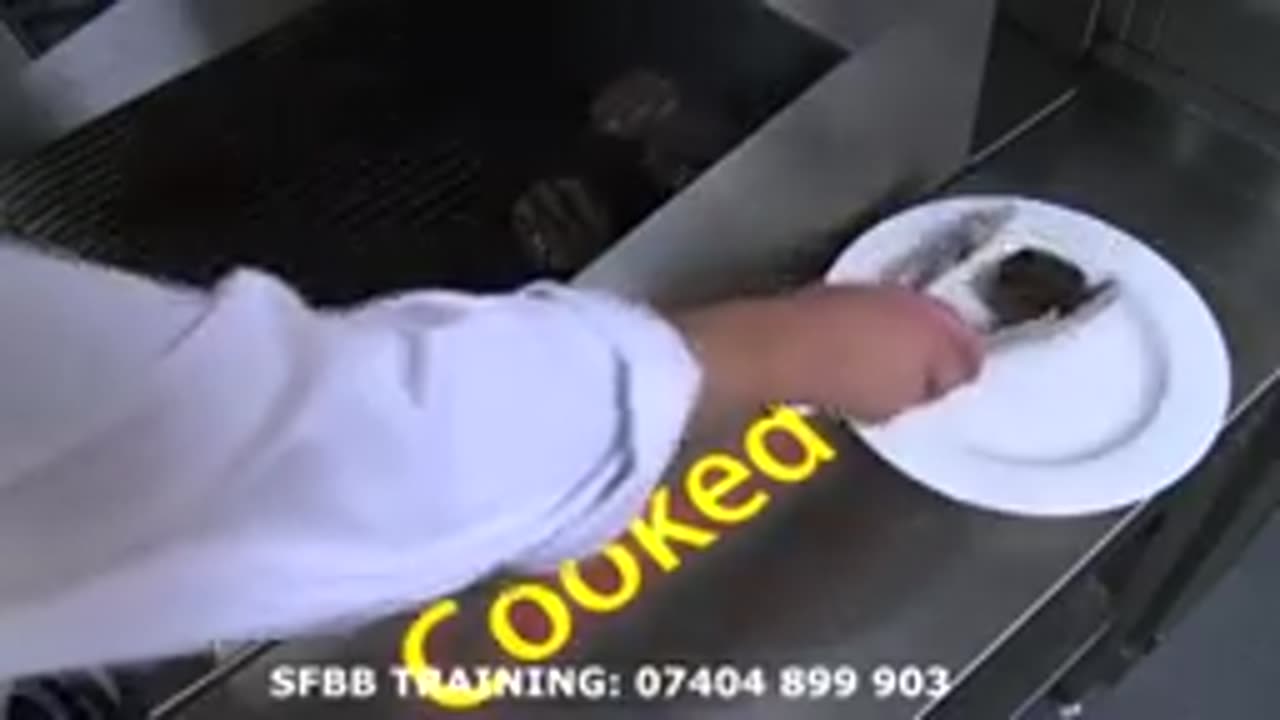Premium Only Content

SFBB Training What is Cross Contamination_ Safer Food Better Business Pack
### **What is Cross-Contamination? (SFBB Training)**
Cross-contamination is a key concept covered in the **Safer Food, Better Business (SFBB)** pack, which is designed by the UK’s Food Standards Agency (FSA) to help food businesses comply with food safety regulations. Cross-contamination occurs when harmful bacteria or allergens are transferred from one surface, food, or person to another, compromising food safety.
---
### **How Does Cross-Contamination Happen?**
1. **Direct Contact**:
- When raw food touches ready-to-eat food (e.g., raw chicken touching salad ingredients).
2. **Indirect Contact (Surface Transfer)**:
- Bacteria or allergens are transferred via contaminated equipment, utensils, or hands. For example:
- Using the same chopping board for raw meat and cooked food without cleaning.
- Using unwashed hands to handle ready-to-eat food after handling raw food.
3. **Drip Contamination**:
- When juices from raw food (e.g., raw meat) drip onto ready-to-eat food in storage or during preparation.
4. **Airborne Contamination**:
- Particles from sneezing, coughing, or allergens like flour dust contaminating surfaces or food.
---
### **Common Sources of Cross-Contamination**
- **Raw Meat, Poultry, and Fish**: Carry harmful bacteria like Salmonella and Campylobacter.
- **Dirty Equipment**: Chopping boards, knives, or surfaces used for both raw and cooked foods.
- **Unclean Hands**: Failing to wash hands properly after handling raw food, waste, or cleaning products.
- **Cloths and Sponges**: Worn or unclean materials used for cleaning surfaces.
- **Improper Storage**: Raw foods stored above cooked or ready-to-eat foods in the fridge.
---
### **How to Prevent Cross-Contamination (SFBB Guidelines)**
#### **1. Food Storage**
- **Separate Raw and Ready-to-Eat Foods**:
- Store raw meat, fish, and poultry in sealed containers on the bottom shelf of the fridge.
- Ready-to-eat foods like salads and desserts should be stored higher up to avoid contamination.
- **Proper Labeling**: Clearly label containers to avoid mix-ups.
#### **2. Cleaning and Disinfection**
- **Use Colour-Coded Equipment**:
- Example: Red for raw meat, green for vegetables, yellow for cooked food.
- **Sanitize Regularly**: Wash and sanitize all utensils, chopping boards, and surfaces after each use.
- **Change Cleaning Cloths Frequently**: Use disposable cloths or wash reusable ones at high temperatures.
#### **3. Personal Hygiene**
- **Handwashing**: Wash hands thoroughly:
- Before preparing food.
- After handling raw food, waste, or cleaning materials.
- **Protective Clothing**: Wear clean aprons, and change them if they become contaminated.
#### **4. Cooking and Preparation**
- **Use Separate Tools**: Always use separate knives, utensils, and boards for raw and cooked foods.
- **Avoid Overcrowding**: Prevent raw and ready-to-eat foods from coming into contact during preparation.
#### **5. Training Staff**
- **Educate Staff**: Ensure staff understand the risks of cross-contamination and follow SFBB guidelines.
- **Monitoring**: Supervisors should observe and correct any unsafe practices.
---
### **The Role of SFBB in Cross-Contamination Prevention**
The **Safer Food, Better Business Pack** includes checklists, guides, and logs to help businesses:
- **Identify Risks**: Pinpoint potential cross-contamination hazards in the food preparation process.
- **Implement Controls**: Use practical solutions like color-coded equipment and proper storage practices.
- **Keep Records**: Maintain cleaning schedules, staff training records, and monitoring logs to show compliance with food safety laws.
---
### **Key Benefits of Cross-Contamination Prevention**
1. Protects customers from foodborne illnesses like Salmonella and E. coli.
2. Helps businesses comply with food hygiene regulations and avoid fines or closures.
3. Builds customer trust by demonstrating a commitment to food safety.
Would you like a more detailed checklist or advice on integrating the SFBB pack into your daily operations?
-
 9:49
9:49
Tundra Tactical
12 hours ago $21.16 earnedThe Best Tundra Clips from 2024 Part 1.
116K10 -
 1:05:19
1:05:19
Sarah Westall
12 hours agoDying to Be Thin: Ozempic & Obesity, Shedding Massive Weight Safely Using GLP-1 Receptors, Dr. Kazer
104K24 -
 54:38
54:38
LFA TV
1 day agoThe Resistance Is Gone | Trumpet Daily 12.26.24 7PM EST
70.5K12 -
 58:14
58:14
theDaily302
21 hours agoThe Daily 302- Tim Ballard
67.4K11 -
 13:22
13:22
Stephen Gardner
15 hours ago🔥You'll NEVER Believe what Trump wants NOW!!
115K305 -
 54:56
54:56
Digital Social Hour
1 day ago $11.95 earnedDOGE, Deep State, Drones & Charlie Kirk | Donald Trump Jr.
65.7K6 -
 DVR
DVR
The Trish Regan Show
16 hours agoTrump‘s FCC Targets Disney CEO Bob Iger Over ABC News Alleged Misconduct
69.7K40 -
 1:48:19
1:48:19
The Quartering
17 hours agoElon Calls White People Dumb, Vivek Calls American's Lazy & Why Modern Christmas Movies Suck!
150K113 -
 2:08:42
2:08:42
The Dilley Show
18 hours ago $37.51 earnedH1B Visa Debate, Culture and More! w/Author Brenden Dilley 12/26/2024
128K43 -
 4:55:59
4:55:59
LumpyPotatoX2
20 hours agoThirsty Thursday on BOX Day - #RumbleGaming
116K8